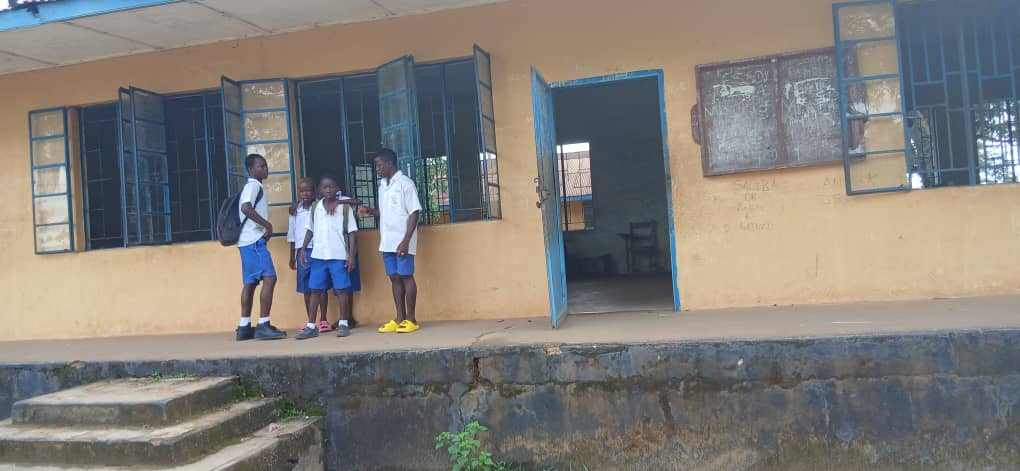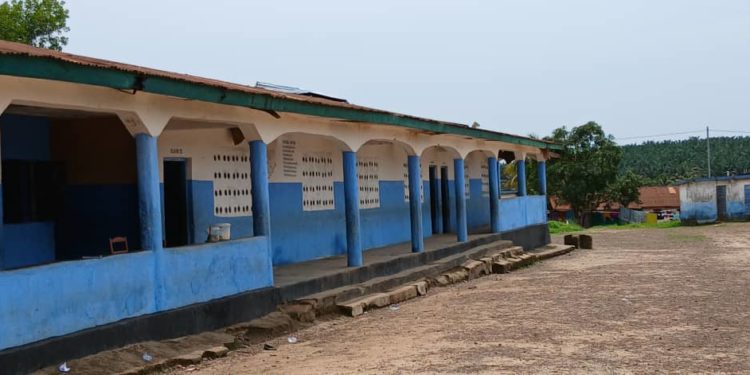By Brima Sannoh
In the dusty classrooms of rural Pujehun District, pupils cram into overcrowded rooms, some sitting on bare floors, others sharing broken benches, listening as their teachers, many unpaid, try to deliver lessons under fading chalkboards and leaking roofs. This is the face of Sierra Leone’s flagship Free Quality School Education (FQSE) programme, an ambitious national effort to lift barriers to education, now strained under the weight of growing enrolment, limited infrastructure, and a deepening crisis of teacher motivation. “I have over 540 pupils and only three classroom blocks,” says Joseph Saffa, headteacher of the National Islamic Mission School in Sahn Malen. “There’s no water, no proper toilets, not enough benches, and only five of our twelve teachers are on the government payroll.”
Saffa’s frustration echoes across the country. Launched by President Julius Maada Bio in 2018, FQSE promised free tuition, textbooks, and a renewed national focus on education. It sparked enthusiasm and a significant rise in school enrolment. But seven years later, educators, students, and parents are asking a difficult question: Is free education enough if quality is left behind?

Before war ravaged its schools in the 1990s, Sierra Leone was once known as the “Athens of West Africa”, home to the continent’s first university, Fourah Bay College, founded in 1827. But the civil conflict reduced much of that legacy to rubble. Since 2018, the government has attempted a revival. In its first year, 21% of the national budget was allocated to education, a significant investment supported by international donors. Millions of children were enrolled, and school feeding programmes were introduced in select districts.
But as numbers grew, cracks emerged. “We only received our first term subsidy in the third term,” says Paul Jusu, vice principal of St. Paul’s Secondary School for Boys in Pujehun. “How can we run a school like that? Teachers are not paid enough, and the cost of living keeps rising.”
On paper, the FQSE programme includes a new curriculum structure and aims to relieve parents of fees, book costs, and uniforms. In practice, many students are still being asked to pay for “practicals”, extra lessons, and classroom essentials. “When the government said education was free, we were happy,” says Edward Lagula, a junior secondary school student. “But now, teachers ask us for money all the time. It feels like nothing changed.” “Sometimes, we sit in class for hours and no teacher shows up,” adds Aminata Kamara, a primary school pupil preparing for national exams. “They say they haven’t been paid. It makes us feel forgotten.”
A 2019 school assessment report revealed that completion rates across primary, junior, and senior secondary schools stood at just 50%. Meanwhile, 18% of primary-aged children, 19% of junior secondary pupils, and 36% of senior secondary students are out of school. The Ministry of Basic and Senior Secondary Education (MBSSE) struggles with data management, making it difficult to track teacher numbers, qualifications, daily attendance, or the needs of children with disabilities or learning difficulties. This undermines planning and resource allocation.
“Overcrowding is the biggest issue,” says Saffa. “We have too many children and too few teachers. Many of the volunteers helping us aren’t trained. And we’ve only received 2,000 Leones this year for all operations.”
Beyond infrastructure, teacher morale has become a growing concern. Many feel underpaid and overworked. “Teachers are the drivers of this programme,” Saffa says. “But without better salaries, allowances for remote areas, or recognition, how can we be expected to deliver quality?”
Jusu is more blunt: “We were deceived. The promises were big, but the reality is we’re left scrambling just to keep our schools open.”
“I check my children’s notebooks, most are empty,” says Miatta Karimu, whose daughters attend Ahmadiyya Secondary School in Bandajuma.
“Either the children have lost interest, or the teachers aren’t showing up.” “If this continues, we’re heading backwards,” warns Amadu Koroma, a father of three.
“Education is becoming poor, even with the Free Quality School Education still in place.”
Civil society leaders are calling for urgent dialogue. “We need a national symposium,” says Ibrahim Borgiwa Swaray, chair of the Pujehun Civil Society Forum. “Teachers, parents, students, everyone must sit together and ask: what’s working, what’s failing, and how do we fix it?”
Meanwhile, the government acknowledges the shortcomings. Abu Kpukumu, Quality Assurance Officer at MBSSE Pujehun, says the ministry is working hard to stabilise the system. “We’re not denying the challenges,” he tells BBC News. “But the programme is still standing after nearly seven years. That means something. It’s our collective responsibility to keep it alive.” Kpukumu defends the 21% budget allocation to education as a major commitment. But he also admits: “It’s not just about money. It’s about delivery, accountability, and listening to the people we serve.”
This article was produced with support from the Africa Transitional Justice Legacy Fund (ATJLF), through the Media Reform Coordinating Group (MRCG), under the project: “Engaging the Media and Communities to Change the Narrative on Transitional Justice Issues in Sierra Leone.”






















